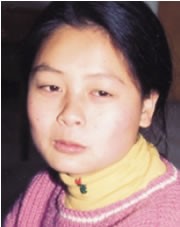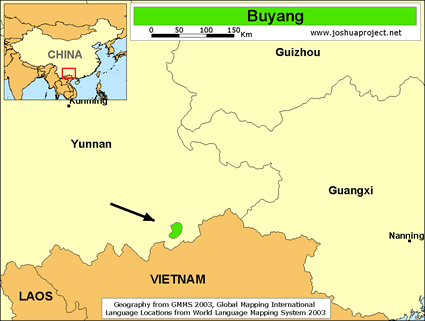The Buyang are officially part of the Zhuang, China's largest official minority. As one anthropologist notes, "After 1953 the Buyang were incorporated into the Zhuang". Buyang, however, is a distinct language and is not intelligible with other forms of Zhuang. The Buyang are known by a number of different names. One visitor in the early 1920s stated, "We slept in a village of Tai people, which the Chinese call Punong, or Punung, or Pulung. We heard them called all three of these pretty names".
This small tribe speaks a language exhibiting influences from many different groups, making it difficult to trace their historical roots. It is known that the Buyang are recent arrivals to their present location. One writer notes, "Due to historical reasons, the Bunong [Buyang] have moved to different places and had different titles but still kept the same characteristics (the same language, customs and traditions)".
The Buyang practice wet-rice agriculture on terraced hillsides. Other crops include sugarcane, tung oil, and tea. Chinese geckos are also caught and used in traditional Chinese medicine to help people regain vitality.
The Buyang worship their ancestors, carefully observing rituals that have been designed to ensure that their forefathers are taken care of in the next life. Food is placed in front of altars along with pictures of deceased family members, so the spirits of the dead will not go hungry. The Buyang also burn large amounts of paper money, believing the practice will break any hold of poverty that may have ensnared the dead.
Ancestor worship has trapped the Buyang in spiritual bondage, keeping them from accepting any social or religious change. Few Buyang have any awareness of the Gospel or the Person of Jesus Christ. All Buyang homes have ancestral altars mounted on the wall of the main room. In the mid-1990s a large revival took place among the Hmong Daw farther south as a result of Gospel radio broadcasts in the Miao language, but few Buyang have any contact with the Hmong Daw.
The Baha Buyang people need to submit to Jesus Christ so they can experience the abundant life he offers them in John 10:10.
Pray for bold workers who are driven by the love of the Holy Spirit to go to them.
Pray for an unstoppable movement to Christ among them.
Pray for the authority of Christ to bind hindering spiritual forces to lead them from darkness to light.
Pray for signs and wonders to happen among them and for great breakthroughs with a rapid multiplication of disciples and house churches.
Scripture Prayers for the Buyang, Baha in China.
Operation China, Asia Harvest, Copyrighted © Used with permission
| Profile Source: Joshua Project |











